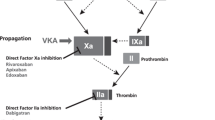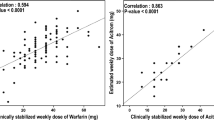Abstract
Therapy with Vitamin K antagonists (VKA) effectively reduces the thrombosis risk in many clinical conditions. Genetic variants of vitamin K epoxide reductase (VKORC-1) are associated with increased VKA effect and bleeding risk. It is unknown whether these variants could also affect the long-term outcome in patients with high-dosage oral anticoagulation and/or more difficult adherence to the therapeutic INR range. Hundred and twenty-four patients with mechanical heart valve replacement assuming VKA were genotyped for VKORC-1 −1639G>A (Rs9923231) polymorphism. Hemorrhage, venous thrombosis and atherothrombotic events were retrospectively assessed for a 6-year period. Furthermore, stability of their INR in relationship with the VKORC-1 genotype was investigated day-by-day for 3 months. No differences were observed in hemorrhage and venous thrombosis events according to rs 9923231. GG genotype carriers (n = 41) had no atherothrombotic events, while 4 strokes, 4 TIA and 3 AMI were diagnosed in A carriers (n = 83; P = 0.0008). During the daily observation period, A allele carriers had lower VKA requirements (4.7, 3.7, 2.2 mg/day for GG/GA/AA genotype respectively; P = 0.00001), higher mean INR (2.7, 2.8, 2.9; P = 0.05) and a higher number of examinations above the therapeutic range than GG carriers (17 % vs. 0 % in GG genotype, P = 0.036). Conversely, patients with GG genotype had a more stable dosage of VKA (P = 0.006) and a higher percentage of examinations under the therapeutic range (51, 43 and 36 % in GG, GA and AA genotype, respectively, P = 0.040). In patients with high dosage VKA, VKORC-1 polymorphism is associated to a different warfarin dosage, anticoagulation level, time spent outside the therapeutic range and, in the long-term, a different incidence of atherothrombotic events.

Similar content being viewed by others
References
Gage BF, Lesko LJ (2008) Pharmacogenetics of warfarin: regulatory, scientific, and clinical issues. J Thromb Thrombolysis 25:45–51
Salem DN, Stein PD, Al Ahmad A, Bussey HI, Horstkotte D, Miller N, Pauker SG (2004) Antithrombotic therapy in valvular heart disease—native and prosthetic: the seventh ACCP conference on Antithrombotic and Thrombolytic Therapy. Chest 126:457S–482S
Cannegieter SC, Rosendaal FR, Wintzen AR, van der Meer FJ, Vandenbroucke JP, Briet E (1995) Optimal oral anticoagulant therapy in patients with mechanical heart valves. N Engl J Med 333:11–17
Rosendaal FR (1996) The Scylla and Charybdis of oral anticoagulant treatment. N Engl J Med 335:587–589
Spronk HM (2006) Vitamin K epoxide reductase complex and vascular calcification: is this the important link between vitamin K and the arterial vessel wall? Circulation 113:1550–1552
Bodin L, Verstuyft C, Tregouet DA, Robert A, Dubert L, Funck-Brentano C, Jaillon P, Beaune P, Laurent-Puig P, Becquemont L, Loriot MA (2005) Cytochrome P450 2C9 (CYP2C9) and vitamin K epoxide reductase (VKORC1) genotypes as determinants of acenocoumarol sensitivity. Blood 106:135–140
Obayashi K, Nakamura K, Kawana J, Ogata H, Hanada K, Kurabayashi M, Hasegawa A, Yamamoto K, Horiuchi R (2006) VKORC1 gene variations are the major contributors of variation in warfarin dose in Japanese patients. Clin Pharmacol Ther 80:169–178
Kosaki K, Yamaghishi C, Sato R, Semejima H, Fuijita H, Tamura K, Maeyama K, Yamagishi H, Sugaya A, Dodo H, Tanigawara Y, Takahashi T (2006) 1173C>T polymorphism in VKORC1 modulates the required warfarin dose. Pediatr Cardiol 27:685–688
Rieder MJ, Reiner AP, Gage BF, Nickerson DA, Eby CS, McLeod HL, Blough DK, Thummel KE, Veenstra DL, Rettie AE (2005) Effect of VKORC1 haplotypes on transcriptional regulation and warfarin dose. N Engl J Med 352:2285–2293
Sconce EA, Khan TI, Wynne HA, Avery P, Monkhouse L, King BP, Wood P, Kesteven P, Daly AK, Kamali F (2005) The impact of CYP2C9 and VKORC1 genetic polymorphism and patient characteristics upon warfarin dose requirements: proposal for a new dosing regimen. Blood 106:2329–2333
Smadja DM, Loriot MA, Hindorff LA, Mellottee L, Gaussem P, Emmerich J (2008) No clear link between VKORC1 genetic polymorphism and the risk of venous thrombosis or peripheral arterial disease. Thromb Haemost 99:970–972
Yuan HY, Chen JJ, Lee MT, Wung JC, Chen YF, Charng MJ, Lu MJ, Hung CR, Wei CY, Chen CH, Wu JY, Chen YT (2005) A novel functional VKORC1 promoter polymorphism is associated with inter-individual and inter-ethnic differences in warfarin sensitivity. Hum Mol Genet 14:1745–1751
Wang D, Chen H, Momary KM, Cavallari LH, Johnson JA, Sadee W (2008) Regulatory polymorphism in vitamin K epoxide reductase complex subunit 1 (VKORC1) affects gene expression and warfarin dose requirement. Blood 112:1013–1021
Schalekamp T, Brasse BP, Roijers JF, van Meegen E, van der Meer FJ, van Wijk EM, Egberts AC, de Boer A (2007) VKORC1 and CYP2C9 genotypes and phenprocoumon anticoagulation status: interaction between both genotypes affects dose requirement. Clin Pharmacol Ther 81:185–193
Wang Y, Zhang W, Zhang Y, Yang Y, Sun L, Hu S, Chen J, Zhang C, Zheng Y, Zhen Y, Sun K, Fu C, Yang T, Wang J, Sun J, Wu H, Glasgow WC, Hui R (2006) VKORC1 haplotypes are associated with arterial vascular diseases (stroke, coronary heart disease, and aortic dissection). Circulation 113:1615–1621
Watzka M, Nebel A, El Mokhtari NE, Ivandic B, Muller J, Schreiber S, Oldenburg J (2007) Functional promoter polymorphism in the VKORC1 gene is no major genetic determinant for coronary heart disease in Northern Germans. Thromb Haemost 97:998–1002
Schwarz UI, Ritchie MD, Bradford Y, Li C, Dudek SM, Frye-Anderson A, Kim RB, Roden DM, Stein CM (2008) Genetic determinants of response to warfarin during initial anticoagulation. N Engl J Med 358:999–1008
Giansante C, Fiotti N, Calabrese S, La Verde R, Pandullo C, Scardi S, Guarnieri G (1997) D-dimer and anticoagulation in patients with mechanical prosthetic heart valves. A 2-year follow-up. Arterioscler Thromb Vasc Biol 17:1320–1324
Kim HS, Lee SS, Oh M, Jang YJ, Kim EY, Han IY, Cho KH, Shin JG (2009) Effect of CYP2C9 and VKORC1 genotypes on early-phase and steady-state warfarin dosing in Korean patients with mechanical heart valve replacement. Pharmacogenet Genomics 19:103–112
Torn M, Bollen WL, van der Meer FJ, van der Wall EE, Rosendaal FR (2005) Risks of oral anticoagulant therapy with increasing age. Arch Intern Med 165:1527–1532
Hindorff LA, Heckbert SR, Smith N, Marciante KD, Psaty BM (2007) Common VKORC1 variants are not associated with arterial or venous thrombosis. J Thromb Haemost 5:2025–2027
Cranenburg EC, Schurgers LJ, Vermeer C (2007) Vitamin K: the coagulation vitamin that became omnipotent. Thromb Haemost 98:120–125
Erkkila AT, Booth SL (2008) Vitamin K intake and atherosclerosis. Curr Opin Lipidol 19:39–42
Naghavi M, Libby P, Falk E, Casscells SW, Litovsky S, Rumberger J, Badimon JJ, Stefanadis C, Moreno P, Pasterkamp G, Fayad Z, Stone PH, Waxman S, Raggi P, Madjid M, Zarrabi A, Burke A, Yuan C, Fitzgerald PJ, Siscovick DS, de Korte CL, Aikawa M, Juhani Airaksinen KE, Assmann G, Becker CR, Chesebro JH, Farb A, Galis ZS, Jackson C, Jang IK, Koenig W, Lodder RA, March K, Demirovic J, Navab M, Priori SG, Rekhter MD, Bahr R, Grundy SM, Mehran R, Colombo A, Boerwinkle E, Ballantyne C, Insull W Jr, Schwartz RS, Vogel R, Serruys PW, Hansson GK, Faxon DP, Kaul S, Drexler H, Greenland P, Muller JE, Virmani R, Ridker PM, Zipes DP, Shah PK, Willerson JT (2003) From vulnerable plaque to vulnerable patient: a call for new definitions and risk assessment strategies: part I. Circulation 108:1664–1672
Virmani R, Kolodgie FD, Burke AP, Farb A, Schwartz SM (2000) Lessons from sudden coronary death: a comprehensive morphological classification scheme for atherosclerotic lesions. Arterioscler Thromb Vasc Biol 20:1262–1275
Cal S, Peinado JR, Llamazares M, Quesada V, Moncada-Pazos A, Garabaya C, Lopez-Otin C (2006) Identification and characterization of human polyserase-3, a novel protein with tandem serine-protease domains in the same polypeptide chain. BMC Biochem 7:9
Dellas C, Schremmer C, Hasenfuss G, Konstantinides SV, Schafer K (2007) Lack of urokinase plasminogen activator promotes progression and instability of atherosclerotic lesions in apolipoprotein E-knockout mice. Thromb Haemost 98:220–227
Acknowledgments
The study has been supported by a Grant to C.G. (Fondo Trieste 2006).
Author information
Authors and Affiliations
Corresponding author
Electronic supplementary material
Below is the link to the electronic supplementary material.
11239_2012_740_MOESM1_ESM.doc
Figure 1. Comparison of Bioanalyzer and sequencing results for -1639G>A polymorphism. Msp I digested amplicons were analyzed on Bioanalyzer (A, C, and E) and compared to results of direct sequencing of the reverse strand (B, D, and F). A, B= GG genotype; C, D = GA genotype; E, F = AA genotype. Supplementary material 1 (DOC 107 kb)
Rights and permissions
About this article
Cite this article
Giansante, C., Fiotti, N., Altamura, N. et al. Oral anticoagulation and VKORC1 polymorphism in patients with a mechanical heart prosthesis: a 6-year follow-up. J Thromb Thrombolysis 34, 506–512 (2012). https://doi.org/10.1007/s11239-012-0740-8
Published:
Issue Date:
DOI: https://doi.org/10.1007/s11239-012-0740-8




